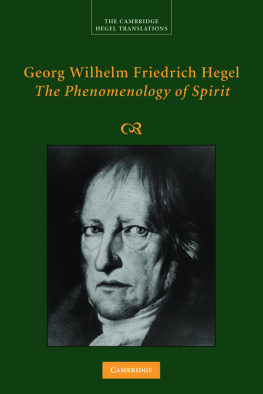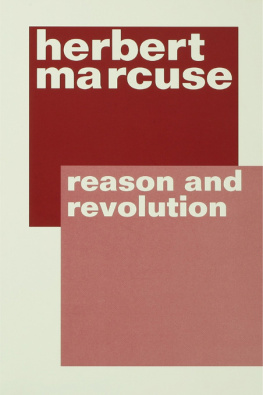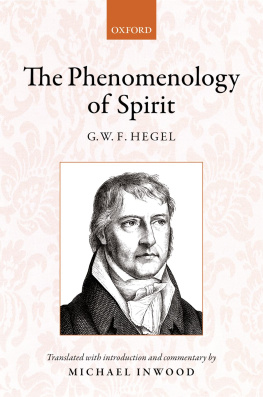Contents
HEGEL
Texts and Commentary
WALTER KAUFMANN is Professor of Philosophy at Princeton University. Born in Germany in 1921, he graduated from Williams College in 1941, and returned to Europe with U. S. Military intelligence during the war. In 1947 he received his Ph.D. from Harvard. He is well known for his works on existentialism and on religion, and for his translations of Goethes Faust and Twenty German Poets.
In his Nietzsche he offered a comprehensive reinterpretation that quickly won wide acceptance. Since then he has been asked to write new articles on Nietzsche for the Encyclopaedia Britannica, Encyclopedia Americana, Colliers Encyclopedia, Groliers Encyclopedia, and the Encyclopedia of Philosophy, among others. His first article on Hegel attracted international attention, and American and European scholars have long urged him to write a book reinterpreting Hegel.
HEGEL
TEXTS AND COMMENTARY
Hegels Preface to His System in a New Translation with Commentary and Who Thinks Abstractly?
Translated and Edited by
WALTER KAUFMANN
UNIVERSITY OF NOTRE DAME PRESS
NOTRE DAME, INDIANA
Copyright 1965 by Walter Kaufmann
Published by arrangement with Doubleday & Company, Inc.
University of Notre Dame Press edition 1977
Notre Dame, Indiana 46556
www.undpress.nd.edu
All rights Reserved All translations in this volume are the authors
Reprinted in 1982, 1986, 1989, 1993, 1998, 2003, 2014
Published in the United States of America
Library of Congress Cataloging-in-Publication Data
Hegel, Georg Wilhelm Friedrich, 17701831.
Hegel: texts and commentary.
Translation of the authors Vorrede to Phnomenologie des Geistes, published in 1807 as v. 1 of his System der Wissenschaft.
Companion volume (including index for both volumes) to the editors Hegel: a reinterpretation (New York, Anchor Books, 1966)
Reprint of the 1966 ed. published by Anchor Books, Garden City, N.Y.
Who thinks abstractly? p.
1. Hegel, Georg Wilhelm Friedrich, 17701831. Phnomenologie des Geistes.2. Knowledge, Theory of.3. Hegel, George Wilhelm Friedrich, 17701831.I. Kaufmann, Walter Arnold.II. Hegel, Georg Wilhelm Friedrich, 17701831. Wer denkt abstrakt?
English. 1977.
B2928.E5K3199719377-89763
ISBN 0-268-01069-2
ISBN 9780268161200
This book is printed on acid-free paper.
This e-Book was converted from the original source file by a third-party vendor. Readers who notice any formatting, textual, or readability issues are encouraged to contact the publisher at .
Contents
Abbreviations
The following abbreviations have been used for works cited often:
B | Briefe von und an Hegel, 4 vols. (195260) |
C | Commentary on VPG |
D | Chapter VII of the companion volume (Anchor Books A528a) |
Dok. | Dokumente zu Hegels Entwicklung, ed. Hoffmeister (1936) |
E | Hegels Encyclopedia, 3rd ed. (1830) |
EGP | Hegels Einleitung in die Geschichte der Philosophie, critical ed. by Hoffmeister (1940) |
H | Cross references to sections of the companion volume (Anchor Books A528a) |
PG | Hegels Phnomenologie des Geistes, ed. Lasson (1907) |
Ros. | Rosenkranz, Hegels Leben (1844) |
VG | Hegels Die Vernunft in der Geschichte, critical ed. by Hoffmeister (1955). All references are to Hegels own MS unless the page number is followed by an L to indicate that the citation is based on the students lecture notes. |
VPG | Hegels Vorrede (Preface) to the Phnomenologie |
WK | Kaufmann, From Shakespeare to Existentialism (Anchor ed.) |
This volume contains the second part of my Hegel: Reinterpretation, Texts, and Commentary, unchanged. This part can be read and studied by itself. The first part, containing the intellectual biography of Hegel and the reinterpretation of his thought, is offered in a companion volume. There the reader will find chapters on Early Development and Influences: 17701800, The First Seven Essays, 18011803, The Phenomenology, The Logic, The System, and Hegel on History; also a long chapter entitled Documentation, or Hegels Development in Letters and Contemporary Reports, a Chronology, and a detailed bibliography both of Hegels writings and of the literature about Hegel.
There are two reasons for dividing the book into two volumes. First, it did not seem desirable to reduce the size of the print and crowd the pages to the extent that would have been required to issue the whole of the original volume in one paperback. Far better to have two volumes.
Secondly, some readers may be interested in the intellectual biography and reinterpretation without feeling inclined to make a close study of the preface to The Phenomenology, with commentary. Conversely, some professors may wish to read this preface with their students, but not the reinterpretation.
Both volumes can be read independently. There are some cross references; but then there are also references to other works. The index contains references to both volumes. Only references that begin with Roman numerals are to the present volume. The others show the reader where he can find further information on various points.
I am delighted by the reception of the hardcover edition and hope that the Anchor edition may help to revive interest in Hegel.
HEGEL
Texts and Commentary
it is not saying too much when I claim that anyone understands Hegels philosophy if he completely masters the meaning of this preface.
RUDOLF HAYM, Hegel und seine Zeit (1857), 215.
the most important of all Hegel texts Whoever has understood the preface to the Phenomenology has understood Hegel.
HERMANN GLOCKNER, Hegel, vol. II (1940), XX, 419.
The Preface to the Phenomenology is one of the greatest philosophical undertakings of all times. HERBERT MARCUSE, Reason and Revolution: Hegel and the Rise of Social Theory (1941), 97.
The Phenomenology is preceded by a remarkable Preface, which is a literary as well as a philosophical masterpiece.
J. N. FINDLAY, Hegel (1958), 83.
The preface roars like a romantic symphony I compare it to a world-historical festival.
GUSTAV EMIL MLLER, Hegel (1959), 203.
The original text of Hegels long preface is far from easy to understand. This fact poses problems for the translator which are alleviated but not solved by the addition of a commentary on facing pages. In all of my other translations, including those in the present volume, I have aimed at the greatest possible faithfulness, to the point of giving the reader some feeling for the authors style. The following translation takes greater liberties than I am wont to take, but is still faithful.
Where the meaning is in doubt, or two interpretations are possible, I have not considered it my task to make up Hegels mind. Where he is ambiguous, I have tried to be. I have not knowingly changed his meaning.
As far as possible, his tone is preserved, too. The alternation between cumbersome sentences that go on much too long and powerful epigrams that spell temporary relief is one of the most striking characteristics of this preface. But for the most part Hegels excessively long sentences had to be broken up a little. He relies heavily on pronouns, both personal and relative, and in German the gender usually makes clear to what they refer, even if the referent is found many lines back. In English, lacking the guide of gender, one often has to repeat the referentand one frequently has to begin a new sentence. Moreover, Hegel begins many sentences with such locutions as For how and what it would be suitable to say. Or: Also because. Or: As firm as.; At the same time, when.; Just as much.












